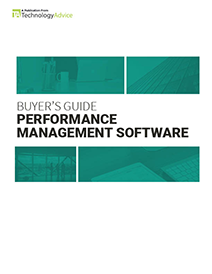Re-designing your performance management process isn’t a quick, one-step change you can implement overnight. But that’s not to say it isn’t important. Having the right practices in place can impact so many aspects of your organization. From employee engagement strategies to turnover rates to creating an open and communicative company culture, having an effective performance management system in place can make all the difference.
ALSO READ: Bonus Time: Using Performance Metrics for Payouts
Research from Deloitte found that in 2014, 68 percent of HR respondents rated performance management as important or very important. In a more recent survey found that 75 percent responded the same way: performance management is now widely acknowledged as something that deserves attention.
But something is wrong with the way many organizations handle their performance. For starters, legacy HR systems aren’t designed to support modern performance management. For another, leadership doesn’t always see the value in performance management. People don’t feel like aa yearly or even quarterly review makes a difference, so they stop engaging with the process.
The good news is that things are changing. Of those asked in a 2015 Global Human Capital Trend survey, 89 percent had recently or were intending to change their performance management process within the next two months.
In this article, we’ll share which practices to implement in order to get the most from your performance management strategy.
1. Keep it Simple
Trying to introduce overly complicated changes won’t encourage people to engage with any new process. There are several ways you can keep things simple, allowing people to give and review feedback at their own pace and have the process seamlessly integrate with existing workflows. Communicating how things will work is a great start, but keeping the feedback process itself simple is also important. You don’t want to overwhelm people or put them off the idea of engaging regularly with whatever process you choose.
2. Have a Purpose
Decide what you want your performance management process to achieve. Do you want to focus on increasing communication between managers and their teams? Fix specific issues that keep arising? Or simply ditch your annual performance review in favor of something more useful that everyone engages with? Whatever your reasons for redesigning your process, let your team have some input. Have a clear idea what your purpose is, and communicate it with the team before and during implementation. Keep the conversation going to make sure people understand how the new process will help.
3. Ditch the Top-Down Only Feedback
Gone are the days when manager reviews were the only source of truth. 360-degree feedback should be a key component in re-designing the review process. It allows for a much broader perspective on each employee, rather than just the opinion of their manager or supervisor. This not only means more perspectives are gained, but also that people can gain more relevant insight, as those they’re working with closely each day are likely to have different thoughts. Ditching just manager-employee feedback and heading for a more all-round approach means managers can also gain valuable perspectives about their leadership skills.
4. Introduce Upward Feedback
360-degree feedback isn’t just team members; it’s also for employees to review superiors. This is a great opportunity for management to develop and act on specific opportunities for growth or better communication. Introducing upward feedback is a great way to promote an open company culture — one where team-members can be honest with their managers. It also means managers have the necessary insight to develop as leaders.
5. Set Regular, Useful Goals
Goal-setting is highly important. It keeps employees on track, motivated, and aligned with company-wide objectives, making team members aware of how they contribute to organizational success. Performance management should be about more than what’s gone well over the last period. It’s also important to focus on future achievements and give your team something to strive toward to keep them engaged and motivated.
* * *
Now you’re ready to revamp your performance management process. From more efficient, engaging reviews to setting great goals that help your organization succeed, the benefits of having an effective system in place are endless.
Steffen Maier is the co-founder of Impraise, a web-based and mobile solution for actionable, timely feedback at work. Impraise turns performance reviews into an easy process by enabling users to give and receive valuable feedback in real-time when it’s most helpful.
Top Human Resources Software Recommendations


